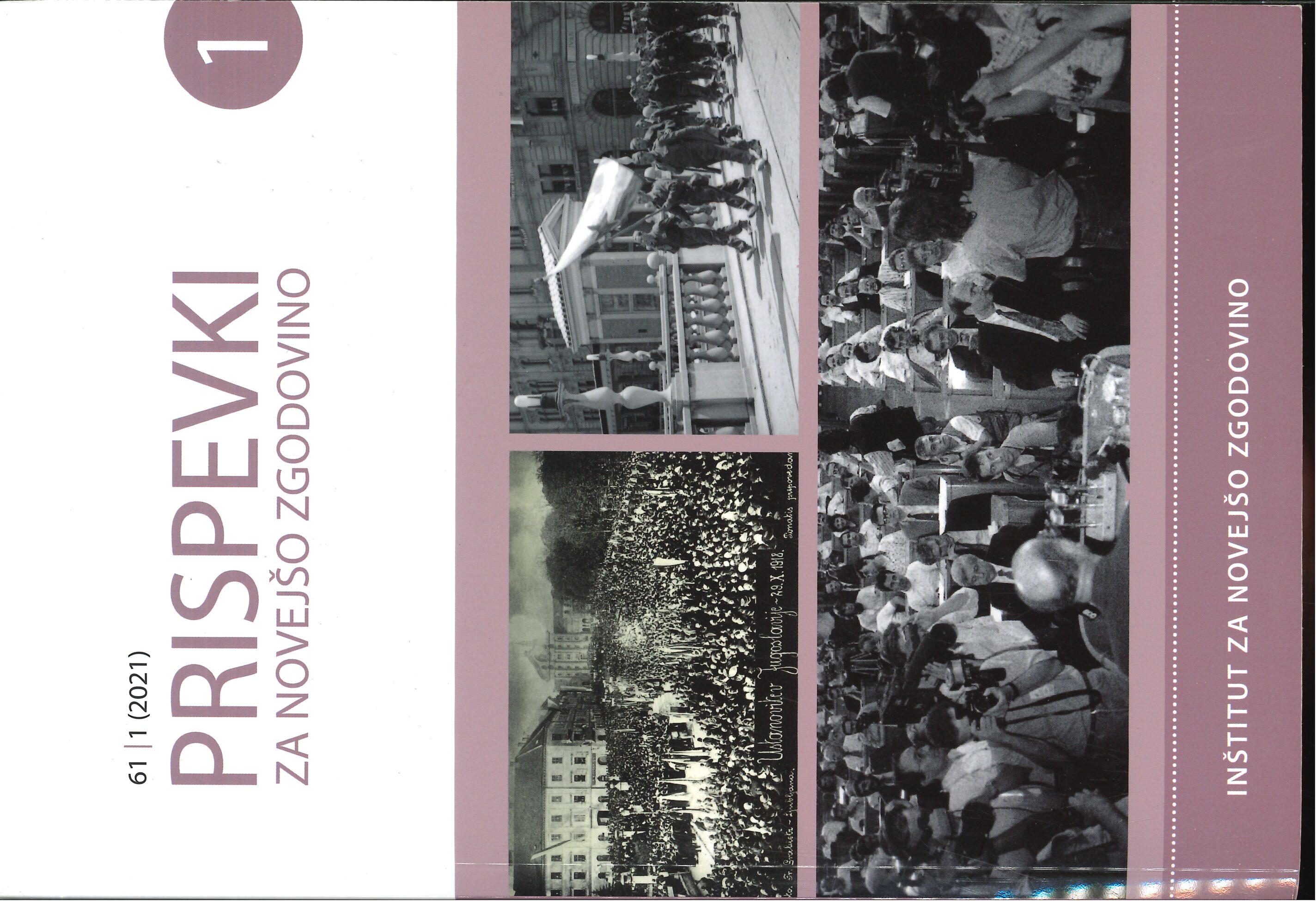Party Congresses as a Legitimising Tool of Communist Power in Yugoslavia (1958–1978)
DOI:
https://doi.org/10.51663/pnz.61.1.05Keywords:
congresses of the League of Communists of Yugoslavia, legitimation of power, socialist self-management, popular sovereignty, economic performanceAbstract
The article offers a fresh approach to assessing the significance of the Communist Party congresses in Yugoslavia by highlighting their legitimising role rather than their presumed political importance. Focusing on the five congresses of the League of Communists of Yugoslavia between 1958 and 1978, the article draws its conceptual framework of the legitimation of power from social theory. Based on the analysis of the congress papers of the leading Yugoslav communists, it questions the role of three sources of legitimacy in justifying communist power: ideology, popular sovereignty, and performance. The article argues that the central source of Yugoslav authorities’ legitimacy was socialist self-management, which was effectively intertwined with the other two sources of legitimacy. Marxist elements were particularly prominent in the late 1950s and in the 1970s, while the importance of the collective will of the people was emphasised fairly uniformly at all the congresses considered. In the 1960s, the element of the regime’s economic efficiency – with the standard of living as the most important component – acquired an important role, which steadily increased until the end of the period under consideration.
References
Alagappa, Muthiah, ur. Political Legitimacy in Southeast Asia: The Quest for Moral Authority. Stanford University: Stanford University Press, 1996.
Beetham, David. »Max Weber and the Legitimacy of the Modern State.« Analyse & Kritik, 13 (1991): 34–45. https://doi.org/10.1515/auk-1991-0102.
Beetham, David. The Legitimation of Power. Atlantic Highlands, NJ: Humanities Press International, 1991.
Bernik, Ivan. »(Ne)legitimnost oblasti v socialističnih družbah: Kaj bi Max Weber resnično rekel?.« Družboslovne razprave, 7/9 (1990): 56–67.
Čepič, Zdenko. »"Federalizacija" federacije 1967–1971.« V: Slovenska novejša zgodovina: Od programa Zedinjena Slovenija do mednarodnega priznanja Republike Slovenije: 1848–1992, ur. Zdenko Čepič et al., 1052–54. Ljubljana: Mladinska knjiga in Inštitut za novejšo zgodovino, 2005.
Čepič, Zdenko. »Oživljanje politične revolucionarnosti.« V: Slovenska novejša zgodovina: Od programa Zedinjena Slovenija do mednarodnega priznanja Republike Slovenije: 1848–1992, ur. Zdenko Čepič et al., 1117–25. Ljubljana: Mladinska knjiga in Inštitut za novejšo zgodovino, 2005.
Denitch, Denis. The Legitimation of a Revolution. London: Yale University Press, 1976.
Gainsborough, Martin. »From Patronage to "Outcomes": Vietnam's Communist Party Congresses Reconsidered.« Journal of Vietnamese Studies, 2/1 (2007): 3–26. https://doi.org/10.1525/vs.2007.2.1.3.
Gašparič, Jure. »Slovensko dojemanje druge Jugoslavije.« V: Slovenija v Jugoslaviji, ur. Zdenko Čepič, 87–104. Ljubljana: Inštitut za novejšo zgodovino, 2015.
Jakovina, Tvrtko. Treća strana hladnog rata. Zaprešić: Fraktura, 2011.
Lilly, Carol S. »Introduction. Regime Consolidation and Strategies of legitimation.« V: State-society Relations in Yugoslavia, 1945–1992, ur. Melissa K. Bokovoy, Jill A. Irvine in Carol S. Lilly, 27–34. Basingstoke: Macmillan, 1997.
Lilly, Carol S. Power and Persuasion: Ideology and rhetoric in communist Yugoslavia, 1944–1953. Boulder, Colo.: Westview Press, 2001.
Niebuhr, Robert Edward. The Search for a Cold War Legitimacy: Foreign Policy and Tito’s Yugoslavia. Boston: BRILL, 2018.
Prinčič, Jože. »Nova gospodarska politika in druga petletka 1956–1960.« V: Slovenska novejša zgodovina: Od programa Zedinjena Slovenija do mednarodnega priznanja Republike Slovenije: 1848–1992, ur. Zdenko Čepič et al., 1000–02. Ljubljana: Mladinska knjiga in Inštitut za novejšo zgodovino, 2005.
Prinčič, Jože in Neven Borak. Iz reforme v reformo: Slovensko gospodarstvo 1970–1991. Ljubljana: Fakulteta za družbene vede, 2006.
Ramet, Sabrina P. The three Yugoslavias: State-building and legitimation, 1918–2005. Bloomington: Indiana University Press, 2006.
Rendla, Marta. »Kam ploveš standard?«: življenjska raven in socializem. Ljubljana: Inštitut za novejšo zgodovino, 2018.
Režek, Mateja. »Na pragu reform.« V: Slovenska novejša zgodovina: Od programa Zedinjena Slovenija do mednarodnega priznanja Republike Slovenije: 1848–1992, ur. Zdenko Čepič et al., 998–1000. Ljubljana: Mladinska knjiga in Inštitut za novejšo zgodovino, 2005.
Režek, Mateja. »Program ZKJ.« V: Slovenska novejša zgodovina: Od programa Zedinjena Slovenija do mednarodnega priznanja Republike Slovenije: 1848–1992, ur. Zdenko Čepič et al., 990–93. Ljubljana: Mladinska knjiga in Inštitut za novejšo zgodovino, 2005.
Režek, Mateja. »Spopad dveh usmeritev.« V: Slovenska novejša zgodovina: Od programa Zedinjena Slovenija do mednarodnega priznanja Republike Slovenije: 1848–1992, ur. Zdenko Čepič et al., 993–98. Ljubljana: Mladinska knjiga in Inštitut za novejšo zgodovino, 2005.
Stanić, Gojko. »Vprašanja zgodovinske periodizacije z vidika družbene vloge Zveze komunistov Jugoslavije v razdobju 1945–1976.« Zgodovinski časopis, 31 (1977): 199–208.
White, Stephen. »Economic Performance and Communist Legitimacy.« World Politics, 38/3 (1986): 462–82.
Zaremba, Marcin. Komunizm, legitymizacja, nacjonalizm: Nacjonalistyczna legitymizacja władzy komunistycznej w Polsce. Warszawa: Wydawn. Trio, 2001.
Downloads
Published
Issue
Section
License
Authors who publish with this journal agree to the following terms:
- Authors retain copyright and grant the journal right of first publication with the work simultaneously licensed under a Creative Commons Attribution License that allows others to share the work with an acknowledgement of the work's authorship and initial publication in this journal.
- Authors are able to enter into separate, additional contractual arrangements for the non-exclusive distribution of the journal's published version of the work (e.g., post it to an institutional repository or publish it in a book), with an acknowledgement of its initial publication in this journal.
- Authors are permitted and encouraged to post their work online (e.g., in institutional repositories or on their website) prior to and during the submission process, as it can lead to productive exchanges, as well as earlier and greater citation of published work (See The Effect of Open Access).


